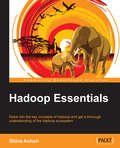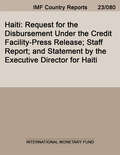- Table View
- List View
Hadoop Essentials
by Shiva AchariIf you are a system or application developer interested in learning how to solve practical problems using the Hadoop framework, then this book is ideal for you. This book is also meant for Hadoop professionals who want to find solutions to the different challenges they come across in their Hadoop projects.
Hadoop for Finance Essentials
by Rajiv TiwariThis book is perfect for developers, analysts, architects or managers who would like to perform big data analytics with Hadoop for the financial sector. This book is also helpful for technology professionals from other industry sectors who have recently switched or like to switch their business domain to financial sector. Familiarity with big data, Java programming, database and data warehouse, and business intelligence would be beneficial.
Haftungsvermeidung in der Unternehmenskrise: Praxiswissen und Taktik für Geschäftsführer und Vorstände
by Christoph PoertzgenDieses Buch richtet sich speziell an Geschäftsführer und Vorstände von Unternehmen, die sich in einer Krise befinden und von Insolvenz bedroht sind. Die Lektüre setzt keine juristischen Kenntnisse voraus. Die besonderen Pflichten und Haftungsrisiken für Manager werden verständlich und praxisnah erläutert. Dazu werden viele systematische Zusammenhänge beleuchtet. Nicht-Juristen lernen die wichtigsten Haftungsfallen kennen und erhalten zahlreiche Tipps zu ihrer Vermeidung.Das Buch dient auch der Vorbereitung und Begleitung einer Beratung durch einen Rechtsanwalt oder sonstigen Krisenberater, und zwar sowohl in der eigentlichen Krise als auch in einem späteren Haftpflichtprozess.
Haftungsvermeidung in der Unternehmenskrise: Praxiswissen und Taktik für Geschäftsführer und Vorstände
by Christoph PoertzgenDieses Buch richtet sich speziell an Geschäftsführer und Vorstände von Unternehmen, die sich in einer Krise befinden und von Insolvenz bedroht sind. Die Lektüre setzt keine juristischen Kenntnisse voraus. Die besonderen Pflichten und Haftungsrisiken für Manager werden verständlich und praxisnah erläutert. Dazu werden viele systematische Zusammenhänge beleuchtet. Nicht-Juristen lernen die wichtigsten Haftungsfallen kennen und erhalten zahlreiche Tipps zu ihrer Vermeidung. Das Buch dient auch der Vorbereitung und Begleitung einer Beratung durch einen Rechtsanwalt oder sonstigen Krisenberater, und zwar sowohl in der eigentlichen Krise als auch in einem späteren Haftpflichtprozess.
Haga Correr la Voz: Relaciones Públicas y Redes Sociales para Escritores
by Llc Tell-Tale Publishing GroupAborde el negocio de la redacción con un plan orientado hacia el éxito. Nancy Gideon, ganadora de premios como escritora de más de 60 libros, comparte su experiencia de más de veinticinco años de carrera para proveerle una guía paso a paso de cómo invertir su tiempo y dinero sabiamente. Haga Correr la Voz: Relaciones Públicas y Redes Sociales para Escritores. El Presupuesto del Tiempo y del Dinero le mostrará cómo establecer un presupuesto personal y de redacción, cómo lidiar con asuntos de impuestos, priorizar y dar valor a su tiempo, y hacer un plan de negocios para su futuro como autor dentro de una narración sencilla y divertida impregnada de ejemplos comunes y consejos para ahorrar tiempo y dinero
Haga que su Día Cuente: El Secreto de su Exito lo Determina su Agenda Diaria
by John C. MaxwellEl experto en liderazgo y autor de éxitos de ventas del New York Times y de la revista BusinessWeek John C. Maxwell muestra cómo sacar provecho de su día. HAGA QUE SU DÍA CUENTE ¿Cómo puede saber si usted está aprovechando al máximo su hoy para que pueda tener un mejor mañana? En esta guía compacta y accesible, Maxwell ofrece ciertas disciplinas diarias que causan gran impacto en poco tiempo. El autor muestra cómo tomar doce impactantes decisiones de vida, que al manejarlas en tan sólo unos minutos al día, le ayudarán a aclarar sus propias prioridades y le conducirán a una vida más exitosa y satisfactoria. Aprenda cómo controlar su agenda, expandir su creatividad y pensamiento, administrar su dinero, mejorar y construir relaciones, fomentar su crecimiento personal, y mucho más. Comience ahora mismo y el éxito de mañana estará asegurado cuando haga que su día cuente.
Hahn and Economic Methodology
by Thomas Boylan Paschal O'GormanHahn on Methodology: The Quest for Understanding addresses two fundamental questions: (i) what is distinctive about economic theorising?; (ii) what is the cognitive value of the outcome of this activity of economic theorising, i.e. economic theory. We will argue that for Hahn, economic theorising is distinctive with respect to four dimensions. Firstly, the aim of economic theory is neither to describe nor explain the real economic world, as in the physical sciences. Rather the aim is to achieve objective, but non-scientific, understanding. Secondly, the central question for economic theory remains for Hahn how to understand, but not to predict as in physics for instance, how decentralised choices interact and perhaps get co-ordinated. Thirdly, Hahn identifies ‘three commitments’ without which, he argues, economic theorising for him is not possible. Finally, economic theorising has a distinctive approach, which Hahn calls its ‘grammar of argumentation’.
Haier Group (A)
by Lynn Sharp Paine Robert J. CrawfordZhang Ruimin, founder and CEO of China's Haier Group, must decide whether to acquire Red Star Electric Appliance Co., an insolvent local manufacturer of washing machines. Although Haier, slated to become one of China's first global brand names, has successfully turned around other failing enterprises by infusing its distinctive culture and management style, it is not clear whether that approach will work at Red Star. Both Haier and Red Star are "collective enterprises."
Haier Hefei Electronics Co. (A)
by Lynn Sharp PaineThe Haier Group, the first mainland Chinese company to make the Financial Times list of Asia's "most admired companies," attributes its success in large measure to the new value system it has sought to instill throughout the organization. However, when Haier takes over the Yellow Mountain television factory in the distant Hefei province at the behest of Hefei's government, workers strike against the Haier culture and what it stands for. The immediate catalyst is the labor contract Haier has asked them to sign. Haier's management must decide what's fair and how to respond to the workers' demands in the face of local government pressure to compromise.
Haier's U.S. Refrigerator Strategy 2005
by Thomas M. Hout Pankaj Ghemawat Jordan SiegelHaier, the first Chinese consumer durable brand in the United States, succeeded in the compact refrigerator, freezer, and air conditioner markets and then built a U.S. factory to enter the full-size market. Issues include the value of a local entrepreneur to the Asian manufacturer entering the United States; brand building and price positioning; the sourcing location decision trade-off between production costs and logistics costs; the role of change in the U.S. appliance distribution channels; global and regional competitive analysis; the response of U.S. competitors to the global sourcing evolution; and the time horizons of Chinese company management.
Haier: Incubating Entrepreneurs in a Chinese Giant
by Rosabeth Moss Kanter Nancy Hua DaiCEO Zhang Ruimin must plan how to accelerate the growth of self-managed micro-enterprises. Platforms were Haier's business platforms operating in five major sectors: white goods transformation, investment and incubation, financial holdings, real estate, and cultural industry. Platform owners incubated micro-enterprises on their platforms with the resources Haier had, but they were not the supervisors of micro-enterprises. His goal was to tear down the walls between the organization, shortening the time the company took to respond to users' needs, with the ultimate goal of "zero distance" between employees and users. Haier had engaged in a series of organizational changes since 2005, the most recent of which started in 2012. His latest experimentation was turning Haier into a platform for entrepreneurship. Employees and those outside Haier could set up micro-enterprises on Haier's platforms. Zhang thought Haier was on the right track, but the model had to prove itself in practice. He set a timetable: the micro-enterprises must reach the tipping point by September 20, 2018, which meant the micro-enterprise would have become a platform to which all resource providers would flock and stay loyal. There was no precedent of transformation like this anywhere. Would Haier succeed? What could Haier do to push the micro-enterprises to get to the tipping point?
Haier: Incubating Entrepreneurs in a Chinese Giant
by Rosabeth Moss Kanter Nancy Hua DaiCEO Zhang Ruimin must plan how to accelerate the growth of self-managed micro-enterprises. Platforms were Haier's business platforms operating in five major sectors: white goods transformation, investment and incubation, financial holdings, real estate, and cultural industry. Platform owners incubated micro-enterprises on their platforms with the resources Haier had, but they were not the supervisors of micro-enterprises. His goal was to tear down the walls between the organization, shortening the time the company took to respond to users' needs, with the ultimate goal of "zero distance" between employees and users. Haier had engaged in a series of organizational changes since 2005, the most recent of which started in 2012. His latest experimentation was turning Haier into a platform for entrepreneurship. Employees and those outside Haier could set up micro-enterprises on Haier's platforms. Zhang thought Haier was on the right track, but the model had to prove itself in practice. He set a timetable: the micro-enterprises must reach the tipping point by September 20, 2018, which meant the micro-enterprise would have become a platform to which all resource providers would flock and stay loyal. There was no precedent of transformation like this anywhere. Would Haier succeed? What could Haier do to push the micro-enterprises to get to the tipping point?
Haier: Taking a Chinese Company Global
by Tarun Khanna Krishna G. Palepu Ingrid VargasIn 2005, Haier, China's leading appliance manufacturer, had over $12 billion in worldwide sales and was the third-ranked global appliance brand behind Whirlpool and GE. Describes Haier's rise from a defunct refrigerator factory in China's Qingdao province to an international player with nearly $4 billion in overseas sales. Haier had followed a nontraditional expansion strategy of entering the developed markets of Europe and the United States as a niche player before venturing into neighboring Asian markets. Facing intense competition and price wars in the domestic market, in 2005 Haier was redoubling its efforts to build a globally recognized brand. Could Haier complete with the likes of Whirlpool and GE in their home market? Could Haier successfully defend against Chinese and multinational challengers in China while building a brand overseas?
Haier: Taking a Chinese Company Global in 2011
by Tarun Khanna Krishna G. Palepu Phillip AndrewsIn 2011, Haier, China's leading appliance manufacturer, had over $20 billion in worldwide sales and had just been named the leading refrigerator manufacturer worldwide. This case describes Haier's rise over three decades, from a defunct refrigerator factory in China's Shandong province to an international player with $5.5 billion in overseas sales. Haier had followed a nontraditional expansion strategy of entering the developed markets of Europe and the United States as a niche player before venturing into Middle Eastern and neighboring Asian markets. Looking ahead to the next decade, Haier CEO Zhang Ruimin saw opportunities for Haier to grow through product diversification and additional market penetration in both developed and emerging markets. He and his colleagues would depend on their experience of acquiring numerous companies, entering and retaining new markets, restructuring the organization, and managing hundreds of subsidiaries around the world. They would need to determine which of the lessons learned from Haier's international operations should be implemented in China and which skills learned at home could best be applied abroad.
Haier: Zero Distance to the Customer (A)
by Dennis Campbell Marshall Meyer Shelley Xin Li Kristin StackCase
Haier: Zero Distance to the Customer (B)
by Dennis Campbell Marshall Meyer Shelley Xin LiSupplement
Haier: Zero Distance to the Customer (C)
by Dennis Campbell Marshall Meyer Shelley Xin LiSupplement
Hainan - State, Society, and Business in a Chinese Province (China Policy Series)
by Kjeld Erik BrødsgaardThis book examines the complex relationship between the state, society and business in China, focusing on the experience of the island province of Hainan. This island, for many years a provincial backwater, was given provincial rank in 1988 and became the testing ground for experiments of an economic, political, and social nature that have received great attention from Beijing, in particular the "small government, big society" project. This book provides a full account of this transition, showing how Hainan casts important light on a number of highly topical issues in contemporary China studies: central-local relations, institutional reform, state-society relations, and economic development strategies. It provides detailed evidence of how relations between party cadres, state bureaucrats, businesses, foreign investors and civil society play out in practice in China today. It argues that despite the liberalization of recent years, especially in the economic sphere, the party state remains the most powerful actor in Chinese society, and that path-breaking reform experiments such as in Hainan remain highly vulnerable due to the central government’s hesitation to commit the resources and unequivocal political support needed for the experiments to be successfully realized.
Hair Salon and Day Spa
by Entrepreneur MagazineSucceed with style! Hair salons and day spas across the country are making as much as $300,000 a year - and you can, too. Whether you want to start a small salon out of your home or open a full-service day spa, this guide will show you exactly how to succeed.You don't even have to be a stylist. If you've got strong business skills, you can open a salon/spa, rent space to stylists, message therapists and nail artists, then sit back and rack in the cash. Inside our guide you'll find:Analyze the market, write a business plan and advertise effectivelyEstablish a website to spread the word and bring in more revenueIncrease sales with no extra effort by applying simple upselling techniquesKeep track of your finances with ready-to-use work sheetsProfessional industry experts share inside information and invaluable advice, revealing how they have been successful in this lucrative business, and more importantly, how you can be successful, too.Attractive hair, newfound energy and a revitalized appearance are always in style, no matter what ups and downs await the economy. Whether you love styling hair or prefer managing personnel, you'll find that it pays to help people look good and feel great. This guide will show you the profitable way of making someone's day. Order today and get started on the path to success!The First Three YearsIn addition to industry specific information, you'll also tap into Entrepreneur's more than 30 years of small business expertise via the 2nd section of the guide - Start Your Own Business. SYOB offers critical startup essentials and a current, comprehensive view of what it takes to survive the crucial first three years, giving your exactly what you need to survive and succeed. Plus, you'll get advice and insight from experts and practicing entrepreneurs, all offering common-sense approaches and solutions to a wide range of challenges. Pin point your target market Uncover creative financing for startup and growth Use online resources to streamline your business plan Learn the secrets of successful marketing Discover digital and social media tools and how to use them Take advantage of hundreds of resources Receive vital forms, worksheets and checklists From startup to retirement, millions of entrepreneurs and small business owners have trusted Entrepreneur to point them in the right direction. We'll teach you the secrets of the winners, and give you exactly what you need to lay the groundwork for success.BONUS: Entrepreneur's Startup Resource Kit!Every small business is unique. Therefore, it's essential to have tools that are customizable depending on your business's needs. That's why with Entrepreneur is also offering you access to our Startup Resource Kit. Get instant access to thousands of business letters, sales letters, sample documents and more - all at your fingertips!You'll find the following:The Small Business Legal ToolkitWhen your business dreams go from idea to reality, you're suddenly faced with laws and regulations governing nearly every move you make. Learn how to stay in compliance and protect your business from legal action. In this essential toolkit, you'll get answers to the "how do I get started?" questions every business owner faces along with a thorough understanding of the legal and tax requirements of your business.Sample Business Letters1000+ customizable business letters covering each type of written business communication you're likelyto encounter as you communicate with customers, suppliers, employees, and others. Plus a complete guide to business communication that covers every question you may have about developing your own business communication style.Sample Sales LettersThe experts at Entrepreneur have compliled more than 1000 of the most effective sales letters covering introductions, prospecting, setting up appointments, cover letters, proposal letters, the all-important follow-up letter and letters covering all aspects of sales operations to help you make the sale, generate new customers and huge profits.
Hair Salon and Day Spa
by The Staff of Entrepreneur MediaThe experts at Entrepreneur provide a two-part guide to success. First, learn how you can make money while making people look good with your own hair salon and day spa. Then, master the fundamentals of business startup including defining your business structure, funding, staffing and more.This kit includes: Essential industry-specific startup essentials including industry trends, best practices, important resources, possible pitfalls, marketing musts, and more Entrepreneur Editors' Start Your Own Business, a guide to starting any business and surviving the first three years Interviews and advice from successful entrepreneurs in the industry Worksheets, brainstorming sections, and checklists Entrepreneur's Startup Resource Kit (downloadable)More about Entrepreneur's Startup Resource KitEvery small business is unique. Therefore, it's essential to have tools that are customizable depending on your business's needs. That's why with Entrepreneur is also offering you access to our Startup Resource Kit. Get instant access to thousands of business letters, sales letters, sample documents and more - all at your fingertips!You'll find the following:The Small Business Legal ToolkitWhen your business dreams go from idea to reality, you're suddenly faced with laws and regulations governing nearly every move you make. Learn how to stay in compliance and protect your business from legal action. In this essential toolkit, you'll get answers to the "how do I get started?" questions every business owner faces along with a thorough understanding of the legal and tax requirements of your business.Sample Business Letters1000+ customizable business letters covering each type of written business communication you're likelyto encounter as you communicate with customers, suppliers, employees, and others. Plus a complete guide to business communication that covers every question you may have about developing your own business communication style.Sample Sales LettersThe experts at Entrepreneur have compiled more than 1000 of the most effective sales letters covering introductions, prospecting, setting up appointments, cover letters, proposal letters, the all-important follow-up letter and letters covering all aspects of sales operations to help you make the sale, generate new customers and huge profits.
Hair and Fibers (Forensic Evidence Ser.)
by Jane Singer John D WrightThis introductory text on labour economics covers topics such as: the shift in America from a manufacturing-based economy to a service economy; the changes in the economic conditions in the US; the implications of NAFTA and GATT; and the labour markets.
Haiti After the Earthquake
by Paul Farmer"On January 12, 2010 a massive earthquake laid waste to Port-au-Prince, Haiti, killing hundreds of thousands of people. Within three days, Dr. Paul Farmer arrived in the Haitian capital, along with a team of volunteers, to lend his services to the injured. In this vivid narrative, Farmer describes the incredible suffering--and resilience--that he encountered in Haiti. Having worked in the country for nearly thirty years, he skillfully explores the social issues that made Haiti so vulnerable to the earthquake--the very issues that make it an "unnatural disaster. " Complementing his account are stories from other doctors, volunteers, and earthquake survivors. Haiti after the earthquake will both inform and inspire readers to stand with the Haitian people against the profound economic and social injustices that formed the fault line for this disaster"--Provided by publisher.
Haiti Hope: Innovating the Mango Value Chain
by Amy C. Edmondson Jean-Francois HarveyHaiti Hope was to provide 25,000 Haitian farmers with world-class business and industry expertise to help them grow mangos more efficiently and abundantly, and secure access to new markets with the aim of doubling their income and raising their standard of living and, ultimately, contributing to the revitalization of the Haitian economy. The project structure devised by the partners to govern execution consisted of an implementation team and operating and steering committees. The partners with the implementer, TechnoServe, had agreed on a strategy that turned out to be difficult to execute due to local institutions, farmer cooperatives, which acted as gatekeepers and made it difficult to reach the critical mass of farmers to participate in the project. TechnoServe's project manager had to convince the partners to shift strategy to work directly with cooperative members rather than with the leadership. The project manager succeeded - Partners accepted to create a new intermediary channel with and for smallholder farmers, termed Producer Business Groups (PBGs). PBGs eschewed the diverse political goals of most cooperatives, and focused on the production and commercialization of members' mangoes and other agricultural products. By 2013, 18,000 farmers had been organized into PBGs for better access to markets, information and agricultural extension services, and approximately 70% of them had adopted best practices from training. Project trained farmers were earning higher prices for mangoes, which rose by 32% on average.
Haiti: Request For The Disbursement Under The Credit Facility-press Release; Staff Report; And Statement By The Executive Director For Haiti (Imf Staff Country Reports)
by International Monetary Fund. Western Hemisphere Dept.A report from the International Monetary Fund.
Haiti: Selected Issues
by International Monetary FundA report from the International Monetary Fund.













